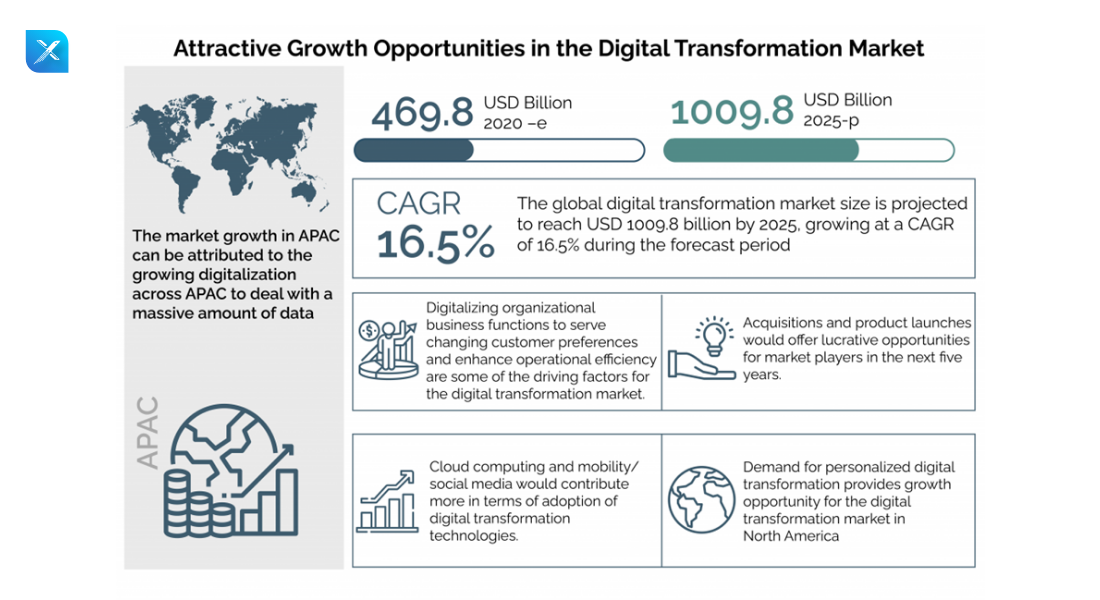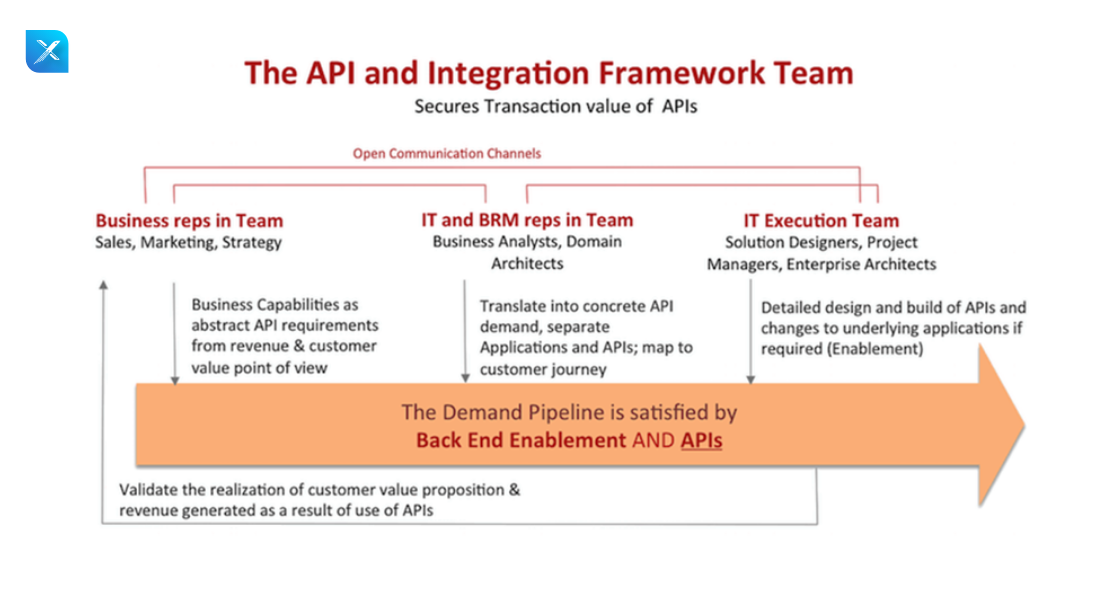AI Development for Enterprises: Cost,...
July 3, 2025

The importance of APIs is something that enterprises have to understand and consider.
Today, digital transformation is practiced by each company in order to grow more by targeting new audiences. Day-to-day operations and record keeping is getting simple with Digital transformation.
User expectations, which are continually evolving, are increasingly driving digital change. The demand to connect an expanding number of apps and digital services is growing at a rapid pace. According to the State of API Integration Report, 83% of IT specialists believe API integration is essential to their company’s success. [Source: GlobeNewswire]
While each digital transformation journey is unique, leveraging APIs clearly gives businesses an edge over their competitors. Using APIs has been found to boost productivity in some firms (58%), while also increasing creativity (48%), employee engagement (43%), and engagement (43%).
An application Programming Interface is a set of resources and tools provided by an operating system that allows programmers to create software applications. It can be viewed more broadly as a group of features that let you use a programming language to utilize an application’s services. However, these roles can vary:
A developer can communicate with a particular piece of software or platform using an API, which can be a library. If not, it might function as a “call” from one program to a section of another application. API is a flexible and effective technique for sharing functionality and enabling communication between applications or services.
To move forward first let’s understand why Digital transformation is more important today than it was before.
People have realized the value of digital transformation between the period of inception and the deception of the Global Pandemic Covid 19. The foundation of organizational innovation and operational efficiency today is digital transformation.
The pace of change is accelerating across all industries, and CEOs sense the strain while also seeing the chance for the entire company to grow. With a major focus on customer-centered value delivery, digital transformation fundamentally transforms how businesses run and are managed.
The advent of social media platforms and web-based marketing solutions has caused a paradigm shift in how customers interact with organizations. With the advent of digitization, the markets have got shrunk. The level of domestic and international competition has equaled. Today, no location on earth is out of reach for business!
Customer expectations for responsiveness and availability across several channels have altered as a result of digital solutions. Businesses are using digital solutions to help them customize their engagements, communications, interactions, and goods to meet the unique needs of their clients.

The implementation of API Strategies through role-playing requires a participatory, team-based approach. Beneficiary, enablers, and Catalysts are the three main roles that are at play. The following team is an example of how the initiative could be realized:

From a commercial standpoint, APIs enable end users to use and customize data to look for solutions to challenging business issues. The key component for bridging the gap between meeting consumer wants (marketing) and creating digital portals that expand businesses is APIs.
In the end, if your company can successfully combine both activities, it will undoubtedly gain a significant competitive edge in this increasingly digital environment.
Furthermore, a corporation with a limited number of applications can benefit from a point-to-point integration strategy. But picture your company having a more than a thousand-app environment. Point-to-point integration may be a disaster in this situation because it would cost time and money on both on-premises and cloud deployments. As a result, this may reduce your overall productivity at work.
Developers need accessibility to modular components like APIs in this situation so they can find, link, and reuse software assets if they want to innovate more quickly. APIs can function as messengers that travel back and forth between databases, programs, and hardware. Unlocking data from within existing systems and connecting that data to other pertinent systems is therefore made simple for enterprises.
Using APIs has a number of significant benefits for a business. They facilitate and speed up the transition process. Here are a few of the key justifications for using APIs.
The potential applications of APIs have no boundaries. Whether you’re talking about machine data, cargo containers, railways trains, or traffic sensors on the road, they can all share data and interact with the outside world via APIs.
Applications that control smart home appliances can be used, PCs can be woven into a connecting IT infrastructure, and APIs can be used to link and integrate external parties. In the modern age of digitization, the world of APIs is broadening horizons and creating new opportunities.
The process of integrating two applications or more than two applications via their APIs in order to carry out a joint operation is known as API integration.
Each application’s API layer establishes the link necessary for the applications to interact with one another.
API integration promises that connected applications will display the most current data while protecting the integrity across a software platform without concern for versioning. While some API management systems come pre-installed with simple integrations, others require more involved integrations.
APIs enable developers to create several complicated features fast without having to spend time designing them from scratch. Instead, they can take advantage of potent third-party features.
Enterprise solutions become very scalable at a low cost when APIs are used. As a result, organizations won’t have to worry as much about scalability, which may be a severe issue when traffic increases exponentially.
Additionally, enterprises may include cutting-edge technology like AI, Big Data, and machine learning thanks to APIs. They enable businesses to access capabilities at a low cost that they would not otherwise be able to.
The majority of businesses employ dozens of various software programs and tools. This as a result creates complexity. The secret to getting them to cooperate effectively is frequently using APIs. Organizations can communicate quickly and reliably between applications with APIs, which leads to increased productivity.
There are more than 60% of APIs used within enterprises and on average, all three API models are used across the enterprise. When digital transformation initiatives are multi-speed, leveraging all three API models can accelerate digitization and unlock new growth opportunities.
Therefore, in order for users to view your database, whether it be through a conventional website or an app, you need to have an API. You can improve the performance of your internal operations and can make them more effective.
Organizations are better able to make wiser decisions, increase customer happiness, promote innovation, and identify new business opportunities once they have access to the data and functions via APIs. Additionally, firms that use and implement APIs can get these benefits.
APIs simplify connections that might otherwise be complicated, making it simpler for programmers to react rapidly to changing needs and, in the end, speeding up the development cycle.
Reusing API designs can enhance scalability, speed up the development process, and act as building blocks.
APIs enable automation by streamlining communication between applications and services, doing away with the need for labor-intensive perfect integration, and manual processes.
The creation and maintenance of custom integrations between several apps can be expensive and time-consuming. APIs’ ease of use and lower cost encourage experimenting and advancement.
Internal applications frequently need to link to other systems or apps. APIs enable partnerships that would not otherwise be conceivable by acting as an easy-to-use interface between apps both within and outside the network, which was not intended designed to connect.
Uber is one of the well-known businesses that was established based on APIs. Uber would not have existed if Twilio, a messaging platform, or Google Maps hadn’t connected via their APIs to Uber. Uber built its own API for developers even though it mainly relied on APIs to get up and running.
Each major transformation goal has been illustrated as a key enabler by an Application programming interface platform strategy. More precisely, we think that a contemporary platform approach that fosters rapid innovation is essential for success and that this platform approach must involve the shift to an organization that prioritizes APIs.
Enterprise-wide digital transformation initiatives are complicated and distinctive. Please get in touch with Inexture if you’d want our platform and API strategy assistance to speed up your transformation endeavor. We’d like to speak with you.